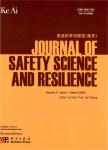U.S. Resilience to large-scale power outages in 2002–2019
作者机构:Department of Industrial and Systems EngineeringUniversity of WashingtonSeattleWA 98105USA Department of Human Centered Design&EngineeringUniversity of WashingtonSeattleWA 98105USA
出 版 物:《Journal of Safety Science and Resilience》 (安全科学与韧性(英文))
年 卷 期:2022年第3卷第2期
页 面:128-135页
核心收录:
学科分类:083002[工学-环境工程] 0830[工学-环境科学与工程(可授工学、理学、农学学位)] 08[工学]
基 金:the National Science Foundation(NSF grant CMMI-1824681)
主 题:Power outage Reliability Natural hazard Cyber attack Sabotage Operational maintenance
摘 要:Prolonged power outages debilitate the economy and threaten public health. Existing research is generally limitedin its scope to a single event, an outage cause, or a region. Here, we provide one of the most comprehensiveanalyses of large-scale power outages in the U.S. from 2002 to 2019. This analysis is based on the outage datacollected under U.S. federal mandates that concern large blackouts, typically of transmission systems and excludemuch more common but smaller blackouts, typically, of distribution systems. We categorized the data into fouroutage causes and computed reliability metrics, which are commonly used for distribution-level small outagesonly but useful for analyzing large blackouts. Our spatiotemporal analysis reveals six of the most resilient *** since 2010, improvement of power resilience against natural hazards in the south and northeast regions,and a disproportionately large number of human attacks for its population in the Western Electricity CoordinatingCouncil region. Our regression analysis identifies several statistically significant predictors and hypotheses forU.S. resilience to large blackouts. Furthermore, we propose a novel framework for analyzing outage data usingdifferential weighting and influential points to better understand power resilience. We share curated data andcode as Supplementary Materials.



